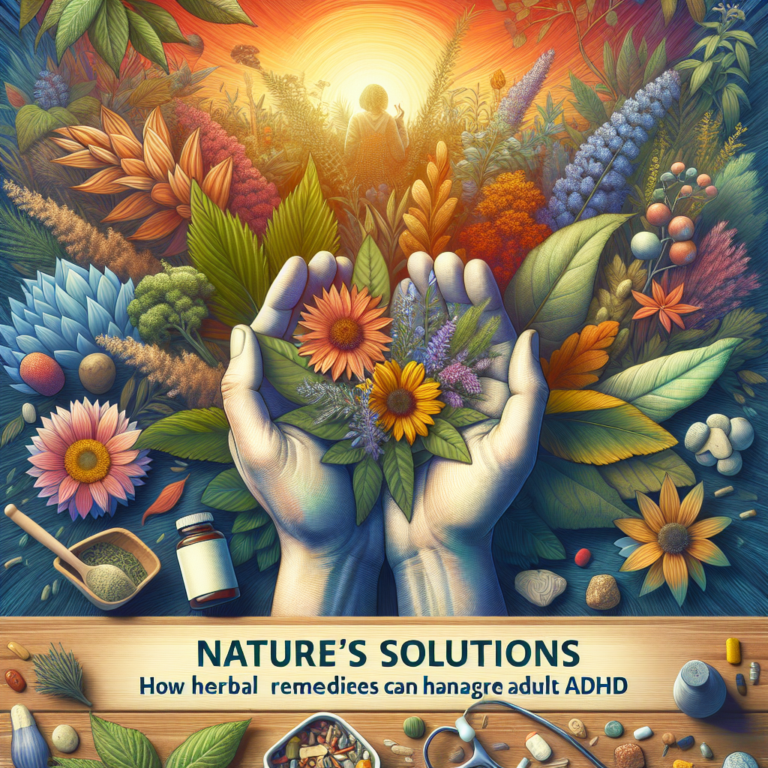
Harnessing Nature: Proven Natural Remedies for Managing Adult ADHD
Introduction
In a world where the pace of life seems to accelerate daily, adults with Attention Deficit Hyperactivity Disorder (ADHD) often find themselves struggling to keep pace with societal expectations. Traditional treatments may provide relief, but many individuals seek alternatives or complementary approaches that align better with their lifestyle or personal beliefs. This quest leads us to explore the captivating realm of natural remedies. In this article, we will delve into Harnessing Nature: Effective Natural Remedies for Managing Adult ADHD, offering insights and strategies to improve focus, calm racing thoughts, and enhance overall well-being.
Imagine being able to harness the soothing power of nature to manage the symptoms of ADHD effectively. This guide will not only highlight the proven remedies backed by science but also provide encouraging case studies illustrating their impact. By the end, you’ll have actionable insights that could transform your day-to-day living.
Understanding Adult ADHD
Before we explore the natural remedies, it’s crucial to understand what ADHD is and how it affects adults. Contrary to common belief, ADHD does not simply manifest as hyperactivity; it encompasses a wide range of symptoms including:
- Inattention: Difficulty focusing on tasks, frequent distractions, and poor time management.
- Impulsivity: Challenges in controlling impulses that lead to hasty decisions and actions.
- Emotional Dysregulation: Intense emotional reactions, including frustration, irritability, and mood swings.
The Impact of ADHD on Daily Life
Adults with ADHD face unique challenges in their careers, relationships, and daily functioning. Feelings of inadequacy, frustration, and the stigma surrounding mental health conditions often add to their struggles. Thus, exploring Harnessing Nature: Effective Natural Remedies for Managing Adult ADHD offers hope to many seeking balance and clarity in their lives.
Natural Remedies for Managing ADHD
1. Nutritional Approaches
Diet plays a significant role in managing ADHD symptoms. Researchers have found that certain dietary patterns can influence cognitive function and mood stability.
Omega-3 Fatty Acids:
A growing body of evidence suggests that omega-3 fatty acids, particularly from fish sources like salmon and mackerel, can enhance cognitive functions. A meta-analysis published in the "Journal of the American Academy of Child & Adolescent Psychiatry" in 2014 indicated that omega-3 supplementation can improve symptoms of ADHD, including inattention and hyperactivity.
Case Study: In one study, a 30-year-old man with a long history of ADHD symptoms embarked on an omega-3 supplementation regimen, consuming high-quality fish oil for three months. The individual reported notable improvements in focus and a reduction in impulsivity, which he attributed directly to dietary modifications.
Magnesium, Zinc, and Iron:
Deficiencies in minerals such as magnesium, zinc, and iron have been linked to increased ADHD symptoms. Foods rich in these minerals—like leafy greens, nuts, seeds, and lean meats—can be integrated into the diet to harness their potential benefits.
Table: Nutrients and Their Role in ADHD
| Nutrient | Benefits | Food Sources |
|---|---|---|
| Omega-3 Fatty Acids | Improves cognitive function | Salmon, walnuts, flaxseeds |
| Magnesium | Calms the nervous system | Spinach, pumpkin seeds, dark chocolate |
| Zinc | Aids in neurotransmission | Oysters, beef, chickpeas |
| Iron | Supports brain health | Lentils, quinoa, dried fruits |
2. Herbal Remedies
Several herbal remedies have gained attention for their effectiveness in managing ADHD symptoms.
Ginkgo Biloba:
Known for its cognitive-enhancing properties, Ginkgo biloba may help increase blood flow to the brain and improve focus. A study published in "Psychopharmacology" found that participants reported enhanced attention and reduced impulsivity after Ginkgo supplementation.
Peppermint Oil:
Aromatherapy using peppermint oil has shown promising results in studies regarding focus and cognitive enhancement. Inhaling the scent of peppermint oil can stimulate the brain’s areas associated with memory and attention.
Case Study: A 27-year-old woman diagnosed with ADHD incorporated daily peppermint oil inhalation into her routine during work hours. After one month, she noted improved concentration while completing tasks, lower levels of stress, and overall enhanced productivity.
3. Mindfulness and Natural Therapies
Mindfulness practices encourage individuals to pay attention to their thoughts and feelings without judgment. These techniques can be incredibly helpful for adults with ADHD.
Meditation:
Research published in "Psychological Science" highlighted that mindfulness meditation could lead to significant improvements in attention span and emotional regulation in ADHD adults.
Nature Therapy:
Spending time in nature, often referred to as ecotherapy, can reduce symptoms of anxiety and depression commonly seen in ADHD. A study by the University of Utah found that participants had decreased ADHD symptoms after spending time in natural environments.
4. Physical Activity
Regular physical activity is not only crucial for physical health but also for mental well-being. Exercise has been shown to increase dopamine levels in the brain, which can enhance attention and mood.
Case Study: A 35-year-old man with ADHD committed to a routine of aerobic exercises such as jogging and cycling three times a week. After several months, he reported feeling more focused during work hours and less overwhelmed by tasks.
Table: Physical Activities and Their Benefits for ADHD
| Activity | Benefits for ADHD |
|---|---|
| Aerobic Exercise | Increases dopamine levels |
| Yoga | Enhances mindfulness |
| Team Sports | Promotes social interaction |
| Martial Arts | Improves self-discipline |
5. Sleep Hygiene
A consistent sleep schedule is vital for managing ADHD symptoms. Poor sleep can exacerbate inattention and impulsivity.
Case Study: A 40-year-old woman with ADHD started practicing good sleep hygiene—establishing a restful evening routine that included winding down without electronics and maintaining a consistent sleep schedule. After two months, she experienced significant improvements in her focus and emotional regulation during the day.
Conclusion
Harnessing Nature: Effective Natural Remedies for Managing Adult ADHD involves a holistic approach that integrates dietary changes, herbal supplements, mindfulness practices, regular physical activity, and improved sleep. Each of these methods taps into natural resources to cultivate a balanced life, supporting cognitive function and emotional well-being.
The path to managing ADHD is highly personal, and what works for one individual may differ for another. However, the anecdotal evidence, case studies, and ongoing research indicate that many people can enhance their lives by exploring these natural remedies.
As you take your next steps, consider which aspects resonate most with you and can be integrated into your lifestyle. Embrace the journey of discovery and empowerment, knowing that nature offers powerful tools to support your well-being.
FAQs
1. Are natural remedies effective for ADHD?
Yes, many individuals report improvements in ADHD symptoms through natural remedies, including dietary changes, herbal supplements, and mindfulness practices.
2. How long does it take to see results from natural remedies?
The timeline varies; some may notice changes within weeks, while others may take months. Consistency is key in observing the effects.
3. Can I use natural remedies along with prescription medications?
It’s essential to consult with a healthcare professional before combining natural remedies with prescription medications to avoid interactions and ensure safety.
4. Are there specific diets recommended for ADHD?
Diets rich in omega-3 fatty acids, high-protein foods, and plenty of fruits and vegetables are often recommended for managing ADHD symptoms. Avoiding processed foods may also be beneficial.
5. How can I incorporate mindfulness practices into my daily routine?
Start with just a few minutes of mindfulness meditation each day, gradually increasing the duration. You can also try mindful breathing exercises or nature walks to enhance focus and awareness.
By understanding and implementing these natural approaches, individuals managing adult ADHD can unlock the potential of their own abilities, cultivating a more fulfilling and focused life.















